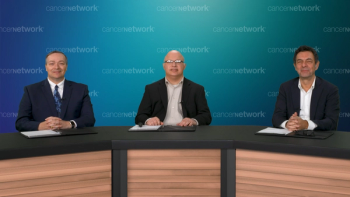
Lenvatinib Combined With Pembrolizumab or Everolimus Lengthens Survival in Advanced Renal Cell Carcinoma
This article reviews the results of the phase 3 KEYNOTE-581/CLEAR trial and features expert insights from trial investigators, Robert J. Motzer, MD, and Toni Choueiri, MD.
KEY TAKEAWAYS:
- Combination therapy that includes an immune checkpoint inhibitor and a tyrosine kinase inhibitor is a promising first-line treatment for advanced clear cell renal cell carcinoma.
- Lenvatinib/pembrolizumab enabled longer progression-free survival and overall survival and better objective response in patients with renal cell carcinoma than sunitinib did.
- Severe adverse events were common but typically effectively managed with dose reductions.
- Starting therapy at a high dose and then lowering it as toxicities develop is an effective strategy for maintaining efficacy.
This year, about 76,000 cases of renal cell carcinoma (RCC) will be diagnosed in the United States, of which roughly 80% will be clear cell renal cell carcinoma (ccRCC). ccRCC has a 5-year survival rate of 50% to 69%. When tumors are large or have metastasized, the 5-year survival rate drops to 10%.1
Patients with advanced RCC with clear cell histology typically are given VEGF receptor tyrosine kinase inhibitors (TKIs), such as sunitinib, as a first-line treatment. Often, however, medication resistance results in disease relapse. An alternative is the use of immune checkpoint inhibitors (ICIs), which can be bundled with TKIs. Combination therapies that include ICIs have been shown to provide better outcomes than sunitinib in patients with metastatic RCC.2
The multitargeted TKI lenvatinib and the PD-1 inhibitor pembrolizumab have individually demonstrated promise as agents against RCC. Results from the phase 3 KEYNOTE-581/CLEAR trial, unveiled at the 2021 virtual American Society of Clinical Oncology Genitourinary Cancers Symposium, and published in New England Journal of Medicine, showed that lenvatinib and pembrolizumab together offer longer progression-free survival (PFS) and overall survival (OS) than does sunitinib.2,3 Investigators are hopeful that this combination therapy will soon be
approved by the FDA as frontline treatment for advanced or metastatic RCC.
Study Design
The phase 3 KEYNOTE-581/CLEAR trial, led by investigators at Memorial Sloan Kettering (MSK) Cancer Center in New York, New York, and Dana-Farber Cancer Institute in Boston, Massachusetts, recruited patients globally from October 2016 to July 2019.A total of 1069 patients with previously untreated advanced RCC were randomized based on geographic location and MSK prognostic risk group. Median ages across treatment groups were 61 to 64 years, and 72% to 77% of participants were men.2
Subjects were randomized in a 1:1:1 ratio to receive one of these regimens: 20 mg of lenvatinib taken orally once daily, plus 200 mg of intravenous pembrolizumab on day 1 of every 3-week cycle; 18 mg of lenvatinib taken orally once daily, plus 5 mg of everolimus, an mTOR kinase inhibitor, taken orally once daily for every 3-week cycle; or 50 mg of sunitinib taken orally once daily for 4 weeks, followed by 2 weeks without treatment.2
The trial’s primary end point was PFS as determined by an independent review committee using RECIST guidelines, version 1.1. Secondary end points included OS and objective response, and additional end points included safety and response duration.2
Trial Outcomes
The lenvatinib/pembrolizumab combination resulted in significantly longer PFS than did sunitinib (median, 23.9 vs 9.2 months; HR for disease progression or death, 0.39; 95% CI, 0.32-0.49; P < .001). Lenvatinib plus everolimus also yielded significantly longer PFS than sunitinib (median, 14.7 vs 9.2 months; HR, 0.65; 95% CI, 0.53-0.80; P < .001). The OS rates were 79.2% for the lenvatinib/pembrolizumab arm, 66.1% for the lenvatinib/everolimus arm, and 70.4% for the sunitinib arm. The OS difference was significant between lenvatinib/pembrolizumab and sunitinib (HR for death, 0.66; 95% CI, 0.49-0.88; P = .005) but not between lenvatinib/everolimus and sunitinib (Table).2
Objective response rates as assessed by an independent review committee were 71.0%, 53.5%, and 36.1% for patients taking lenvatinib/pembrolizumab, lenvatinib/everolimus, and sunitinib, respectively; the complete response (CR) rates were 16.1%, 9.8%, and 4.2%, respectively.2
“The outcome of the trial showed that there was a really powerful effect on PFS with lenvatinib/pembrolizumab (with a median PFS of more than 23 months) compared with sunitinib,” said investigator Robert J. Motzer, MD, head of the kidney cancer section of MSK’s Genitourinary Oncology Service. “There was a high response rate of now more than 70%. It’s the first time we’ve crossed that margin, and—also notable—[achieved] a 16% complete response rate by independent review.” Fewer than 5% of patients experienced overt disease progression in the trial, Motzer added.
In the trial’s lenvatinib/pembrolizumab arm, median length of treatment was 17.0 months compared with 11.0 months in the lenvatinib/everolimus arm and 7.8 months in the sunitinib arm. At data cutoff in August 2020, 40% of those taking lenvatinib/pembrolizumab were still receiving treatment compared with 31.4% and 18.8% of those taking lenvatinib/everolimus and sunitinib, respectively. The primary reason for discontinuation in any group was disease progression.2
Adverse Events
Nearly every study participant in the lenvatinib/pembrolizumab (99.7%), lenvatinib/everolimus (99.7%), and sunitinib groups (98.5%) experienced at least 1 adverse event (AE) during the trial. A total of 82.4% of participants in the lenvatinib/pembrolizumab arm experienced at least one grade 3 or higher event vs 83.1% in the lenvatinib/everolimus arm and 71.8% in the sunitinib arm.2
Diarrhea was the most common AE, reported by 61.4% in the lenvatinib/pembrolizumab arm, 66.5% in the lenvatinib/everolimus arm, and 49.4% in the sunitinib arm. Other AEs of grade 3 or higher reported by 10% or more participants in any group included hypertension, fatigue, increased lipase level, nausea, and elevated triglycerides.2
In the lenvatinib/pembrolizumab group, AEs led to discontinuation of 1 or both drugs in 37.2% of patients: 25.6% stopped lenvatinib, 28.7% stopped pembrolizumab, and 13.4% stopped both. A total of 68.8% of participants needed to lower the lenvatinib dose, and in 78.4% of participants in the same arm, use of either or both drugs was interrupted due to AEs.2
For patients in the lenvatinib/pembrolizumab group who discontinued treatment because of AEs, median time to discontinuation was 8.97 months. Median time to discontinuation in the lenvatinib/everolimus group was 5.49 months. Of those taking lenvatinib/everolimus, 27.0% experienced AEs that led to a discontinuation of 1 or both drugs: 22.0% stopped lenvatinib, 24.8% stopped everolimus, and 18.9% stopped both. A total of 73.2% in this group required dose reductions of 1 or both drugs, and 83.4% experienced an interruption in their regimen. In the sunitinib group, 50.3% of patients required a dose reduction and 53.8% had their treatment interrupted. A total of 14.4% of the sunitinib group experienced AEs sufficient to discontinue treatment; the discontinuers received the drug for a median of 4.57 months.2
Dosing Strategy
According to Motzer and colleagues, pausing and restarting lenvatinib treatment or lowering the dose is a common technique for providing patients longer-term benefits while guarding against the drug’s AEs, which can be managed appropriately if recognized early in a patient’s course of treatment.
Motzer has considerable experience treating patients with the lenvatinib/pembrolizumab combination, and he feels patients tend to tolerate it well. “The key is to start out with the full recommended dose of lenvatinib, and then, as toxicities or AEs are seen, to individualize treatment by dose reduction of the lenvatinib,” he said. More than half of his patients end up on reduced doses of lenvatinib, typically at a maintenance dose of 10 mg, which he noted is a comfortable long-term dose. “But I do think the high dose early on may be important for the extreme efficacy that’s seen with the regimen,” Motzer said.
Investigator and trial co-lead Toni Choueiri, MD, director of the Lank Center for Genitourinary Oncology and the Kidney Cancer Center at Dana-Farber, agreed with the strategy of beginning treatment at a high dose and then reducing it. “That’s not a bad [option], as long as you know how to manage toxicities,” he said. “Some patients are going to stay on lenvatinib at 20 mg daily; others may need to decrease to 18 mg or 14 mg or even lower as long as their disease is controlled.”
Choueiri also pointed out that toxicities are relative in cancer medications: “The good thing is that the grade 3 or 4 specific treatment-related adverse events [with lenvatinib/pembrolizumab] tend to be low.” Although data on patients’ self-reported quality of life can provide a more complete picture of the success of a drug or drug combination than toxicity data, Choueiri noted that the oncology community has yet to get that data on lenvatinib/pembrolizumab.
How Combinations Compare
Although both lenvatinib regimens showed longer PFS than sunitinib, only lenvatinib/pembrolizumab showed greater OS. Investigators said this finding confirms that a combination therapy encompassing an ICI and a TKI is a key first-line treatment in advanced RCC.
Motzer highlighted the importance of the CLEAR trial as compared with past trials that tested combinations such as ipilimumab/nivolumab, axitinib/pembrolizumab, and nivolumab/cabozantinib, all of which showed benefit for patients with advanced kidney cancer. The CLEAR trial, in contrast to these, was a 3-arm study in which 2 arms were compared directly with the control arm of sunitinib—long a dominant monotherapy—and not with each other.
“It’s really the first of these trials to have a contemporary control arm that does not include an immunotherapy or PD-1 agent,” Motzer said. “So its significance, to me, is that it really shows proof of principle about the importance of immunotherapy therapy in first-line RCC treatment to achieve that OS benefit, and benefits in progression-free survival and response rate were seen as well.”
Investigators have been seeking an alternative to sunitinib because of deficits in its ability to significantly lengthen PFS and OS and because of decreases in patients’ quality of life, according to Choueiri.
REFERENCES
1. National Cancer Institute – Center for Cancer Research. Clear cell renal cell carcinoma. March 17, 2020. Accessed March 15, 2021. https://www.cancer.gov/pediatric-adult-rare-tumor/rare-tumors/rare-kidney-tumors/clear-cell-renal-cell-carcinoma
2. Motzer R, Alekseev B, Rha SY, et al; CLEAR Trial Investigators. Lenvatinib plus pembrolizumab or everolimus for advanced renal cell carcinoma. N Engl J Med. Published online February 13, 2021. doi:10.1056/NEJMoa2035716
3. Motzer RJ, Porta C, Eto M, et al. Phase 3 trial of lenvatinib (LEN) plus pembrolizumab (PEMBRO) or everolimus (EVE) versus sunitinib (SUN) monotherapy as a first-line treatment for patients with advanced renal cell carcinoma (RCC) (CLEAR study). J Clin Oncol. 2021;39(suppl 6):abstr 269. doi:10.1200/JCO.2021.39.6_suppl.269
Editor’s Note: Interview quotes slightly modified for readability.
Newsletter
Stay up to date on recent advances in the multidisciplinary approach to cancer.

































